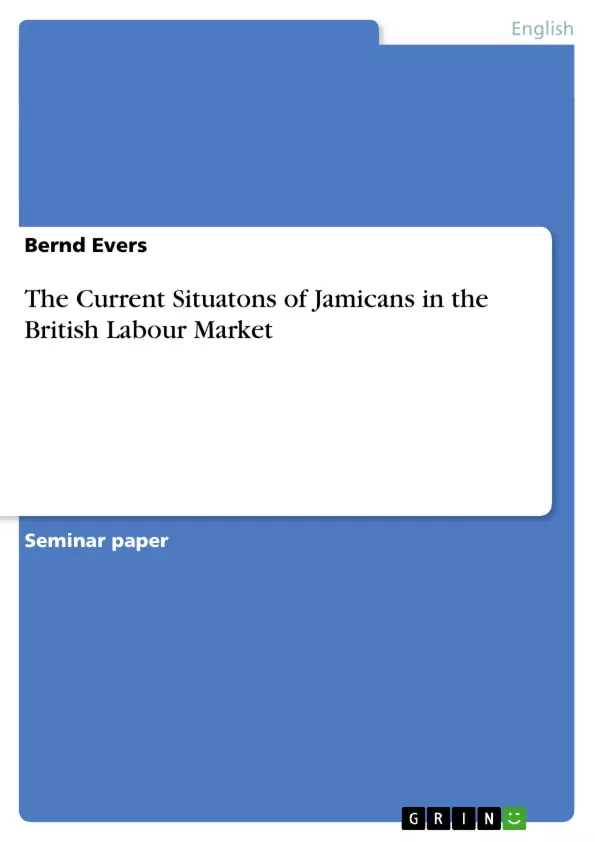Since the 2nd World War Great Britain has tried to fill gaps on its labour market by people from
the Commonwealth. Indies, Pakistani and Caribbean were attracted by prospects of high wage
and social security. On the following pages I want to regard the situation of the Jamaican immigrants,
the largest section among the Caribbean who have entered Britain after 1945. I will focus
on their reasons for immigration, their situation in the educational system and in the British labour
market in past and present. The paper is a formulation of a talk from the 23rd January 2001. For the immigrants from the underdeveloped Caribbean islands, Britain seems as kind of wonderland.
Britain in their eyes does not only mean wealth and security, but as Christian society also
tolerance and charity towards strangers. Many Jamaicans spend all their money to offer their
children better education and a better future. All these expectations had lead to a fluctuation of
immigrants from the Caribbean after the post-war period. The most important reason for leaving
Jamaica is said to be the prospect of further education. In a study from 1994, 25 % of all immigrants
accounted for their step by the prospect of education; another 17 % left their home because
of work and economic prospects1. 1: Saunders, Dave. The West Indians in Britain. London: Batsford Academic and Educational, 1984. 20.
Inhaltsverzeichnis (Table of Contents)
- Introduction
- The Jamaicans in Britain
- Great Expectations
- Change of environment
- The Jamaicans on the British job market
- From the 2nd World War to Thatcherism
- The Present Situation
- Jamaicans in the educational system
- Conclusion
Zielsetzung und Themenschwerpunkte (Objectives and Key Themes)
This paper examines the situation of Jamaican immigrants in the British labor market since the end of World War II. It delves into their motivations for immigrating, their experiences in the educational system, and their challenges and successes in the labor market, both historically and in the present day.
- The impact of Jamaican immigration on the British labor market
- The role of education and skills in the integration of Jamaican immigrants
- The changing social and economic context of Jamaican immigrants in Britain
- The presence of discrimination and prejudice against Jamaican immigrants
- The challenges and opportunities faced by Jamaican immigrants in contemporary Britain
Zusammenfassung der Kapitel (Chapter Summaries)
- Introduction: Introduces the topic of Jamaican immigration to Britain after World War II and outlines the paper's focus on the reasons for immigration, educational experiences, and labor market experiences of Jamaican immigrants.
- The Jamaicans in Britain: This section examines the motivations behind Jamaican immigration to Britain, highlighting the allure of wealth, security, and opportunity in a perceived Christian society. The section also discusses the challenges of adjusting to a new environment, including cultural differences and discrimination.
- Great Expectations: Explores the hopes and aspirations of Jamaican immigrants, emphasizing the desire for a better future for their children through education. This section also presents statistics on the factors driving immigration, including education and economic prospects.
- Change of environment: Contrasts the social and economic realities of Jamaica with those of Britain, highlighting the challenges of adapting to a highly industrialized society. This section discusses the concentration of Jamaican immigrants in urban areas and the difficulties they faced in navigating a new culture.
- The Jamaicans on the British job market: This section examines the experiences of Jamaican immigrants in the British labor market, starting with the favorable initial conditions in the post-war period. It then discusses the changing landscape, including the introduction of immigration restrictions and the shift in demand towards skilled labor.
- From the 2nd World War to Thatcherism: Traces the evolution of the Jamaican experience in the British labor market from the early post-war period to the 1970s. The section highlights the early demand for Jamaican workers, the impact of immigration restrictions, and the challenges posed by the economic downturn of the 1970s.
- The Present Situation: Examines the contemporary situation of Jamaican immigrants in the British labor market, emphasizing the challenges they face in a changing economic and social landscape. The section discusses the competition from other immigrant groups, particularly those from the Indian subcontinent, and the difficulties Jamaican immigrants face in securing stable employment and career advancement.
Schlüsselwörter (Keywords)
Jamaican immigration, British labor market, post-war period, education, discrimination, cultural adjustment, economic opportunities, social integration, skilled labor, unemployment, cultural differences, social inequalities, British society, immigrant experiences, social mobility.
Frequently Asked Questions
Why did many Jamaicans immigrate to Britain after WWII?
The primary motivations were the prospects of higher wages, social security, better economic opportunities, and advanced education for their children.
What were the "Great Expectations" of Jamaican immigrants?
Many saw Britain as a "wonderland" of wealth and security, expecting a tolerant Christian society that would offer their families a better future.
How has the demand for Jamaican labor changed over time?
Initially, Britain actively recruited Commonwealth citizens to fill labor gaps. Later, demand shifted toward highly skilled labor, and immigration restrictions were introduced.
What challenges do Jamaicans face in the British job market today?
Challenges include discrimination, competition from other immigrant groups, and difficulties in securing stable employment and career advancement in a changing economy.
What role does education play in the integration process?
Education is a key driver for social mobility; however, many immigrants faced barriers within the educational system that impacted their long-term job prospects.
- Citar trabajo
- Bernd Evers (Autor), 2001, The Current Situatons of Jamicans in the British Labour Market, Múnich, GRIN Verlag, https://www.grin.com/document/20801



